
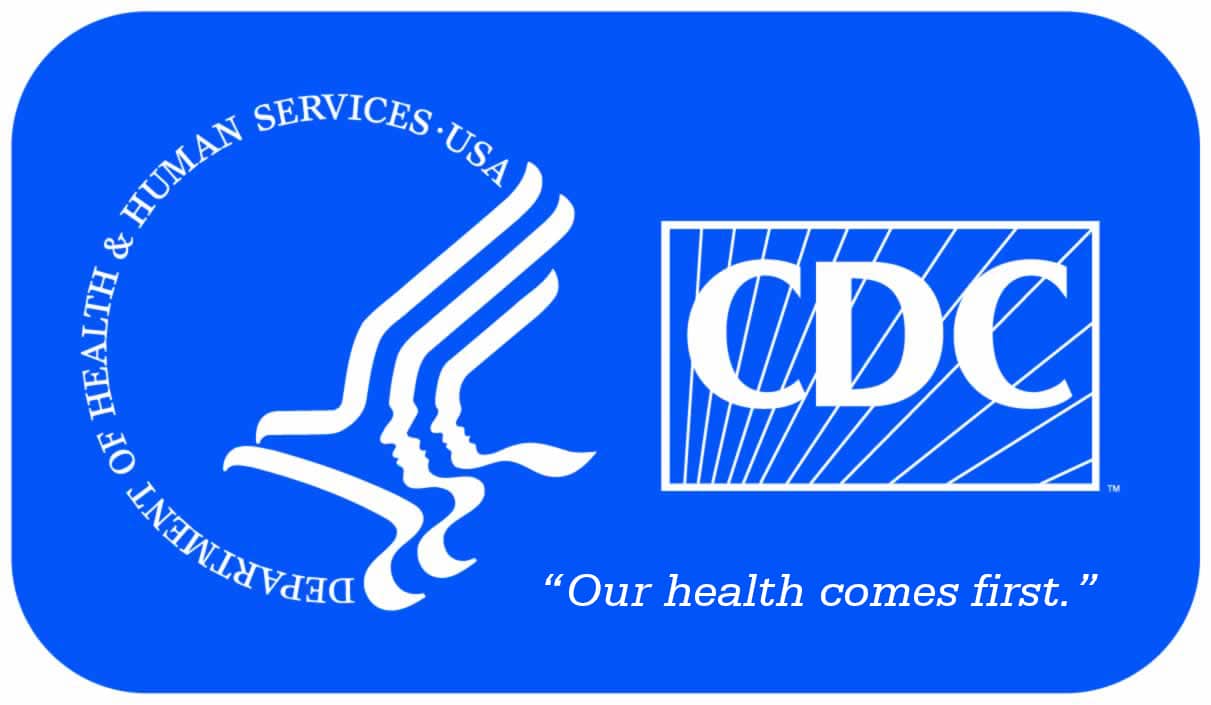
Who Owns the CDC?
by A Midwestern Doctor | Oct 20, 2022
Many of you are understandably outraged at the CDC’s recent unanimous decision to add the COVID-19 vaccines to the pediatric schedule. The decision is completely indefensible, and will result in millions of children being forced to be vaccinated for no benefit and substantial risk. For those who have any doubts this will happen, Tucker Carlson eloquently refuted those arguments:
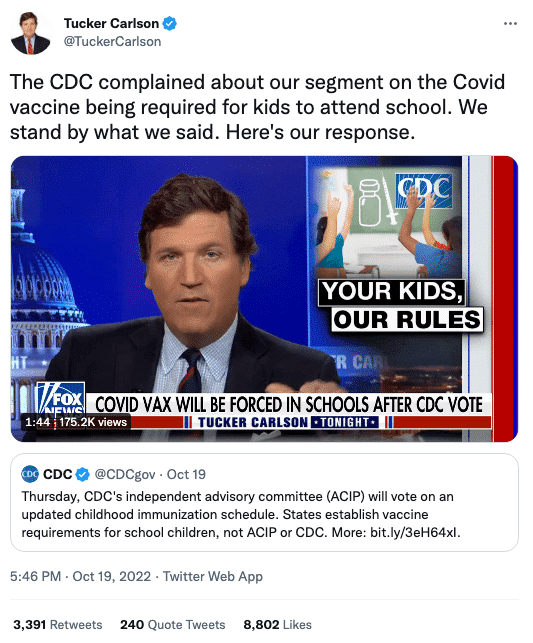
In democratic republics, it should not be possible for unelected groups to forcefully dictate the lives of citizens without those policies being legalized by the legislative process. Unfortunately, our bureaucracy has bypassed that process by allowing committees (whose members are appointed rather than being elected democratically) to craft “guidelines” (as this is the limit of their authority), and then have the rest of the government (and media) treat those guidelines as law. Unfortunately, the members of these committees tend to be individuals who have been bribed and inevitably arrive at conclusions that support their sponsors.
Two excellent recent examples were the NIH panel (directly appointed by Fauci) recommending remdesivir while prohibiting ivermectin while having extensive financial ties to remdesivir’s manufacture, and that of the committee which made the highly questionable guideline for almost everyone to take statins having extensive financial ties to the statin manufacturers.
Although guidelines should only be treated as advice rather than law (this in fact was the decision of a federal judge), there has instead been a continual push to strengthen the guidelines and force ones that border upon absurdity onto the American people. In California for example, the state chosen to pioneer vaccine mandates for our nation, countless parents have been forced to flee the state so their children can remain in school, and parents who are not financially advantaged have been forced to make many very difficult decisions because of these mandates (many of these stories are quite tragic).
Recently this guideline-based governance ratcheted up another notch as California passed a law that stated anyone physician who provides advice to a patient that conflicts with a CDC guideline is guilty of professional misconduct. As you can imagine, this sets a variety of concerning precedents, such as how “advisement that does not carry the weight of law” can be allowed to supersede our sacred constitutional freedoms that have been enshrined in the Bill of Rights, and previously have been consistently upheld by our courts.
Throughout its history, the CDC and its advisory committee the ACIP, have consistently voted to approve each vaccine presented before them, regardless of the evidence against doing so (and as Steve Kirsch recently proved, its leadership has willfully disregarded that evidence). This raises an obvious question; why is it that the ACIP always acts in this way?
When examining complex questions, one helpful strategy, Occam’s Razor, is to first consider the simplest explanation and see if it fits relatively well to addressing the question at hand. In many areas of medicine (e.g. journal publications, research findings, and medical practices chosen by physicians or hospitals), there is a tendency to adhere to the financial interests of the involved parties. Not surprisingly, this is also the behavior guideline committees typically follow so the question naturally becomes: what are the financial conflicts of interest of the CDC?
The CDC Foundation
Typically in Democracies, “bribery” is illegal, but as the country becomes more and more corrupt, backdoor after backdoor is made that effectively legalizes the bribery. One of the best descriptions I have ever seen of this corrosive process is shown in this video that was made almost a decade ago:
In the case of the CDC, they have come up with a rather simple solution to legalizing corruption. If you view their website, you will frequently encounter this comforting disclaimer:
“CDC, our planners, content experts, and their spouses/partners wish to disclose they have no financial interests or other relationships with the manufacturers of commercial products, suppliers of commercial services, or commercial supporters. Planners have reviewed content to ensure there is no bias. CDC does not accept commercial support.”
To allow widespread corruption while simultaneously maintaining the veracity of this statement, there are two simple loopholes that can be utilized The first is to use a third party to hide the money and the second is to directly profit from pharmaceutical sales.
In 1983, Congress authorized the CDC to accept gifts “made unconditionally…for the benefit of the [Public Health] Service or for the carrying out of any of its functions.” In 1992, Congress established The National Foundation for the Centers for Disease Control & Prevention so that CDC could obtain additional funding for its work, or put differently create a third party to pass money along to the CDC.
Comically enough, many other agencies within the federal government, including the CIA and the NIH, also have their own foundations that were also created by congress to allow them to access corporate bribes donations that are not subject to legal oversight such as freedom of information act requests). Not surprisingly, many of the directors of these foundations like their peers in government, often follow a revolving door and end up in high-paying executive roles at major pharmaceutical companies after leading these foundations.
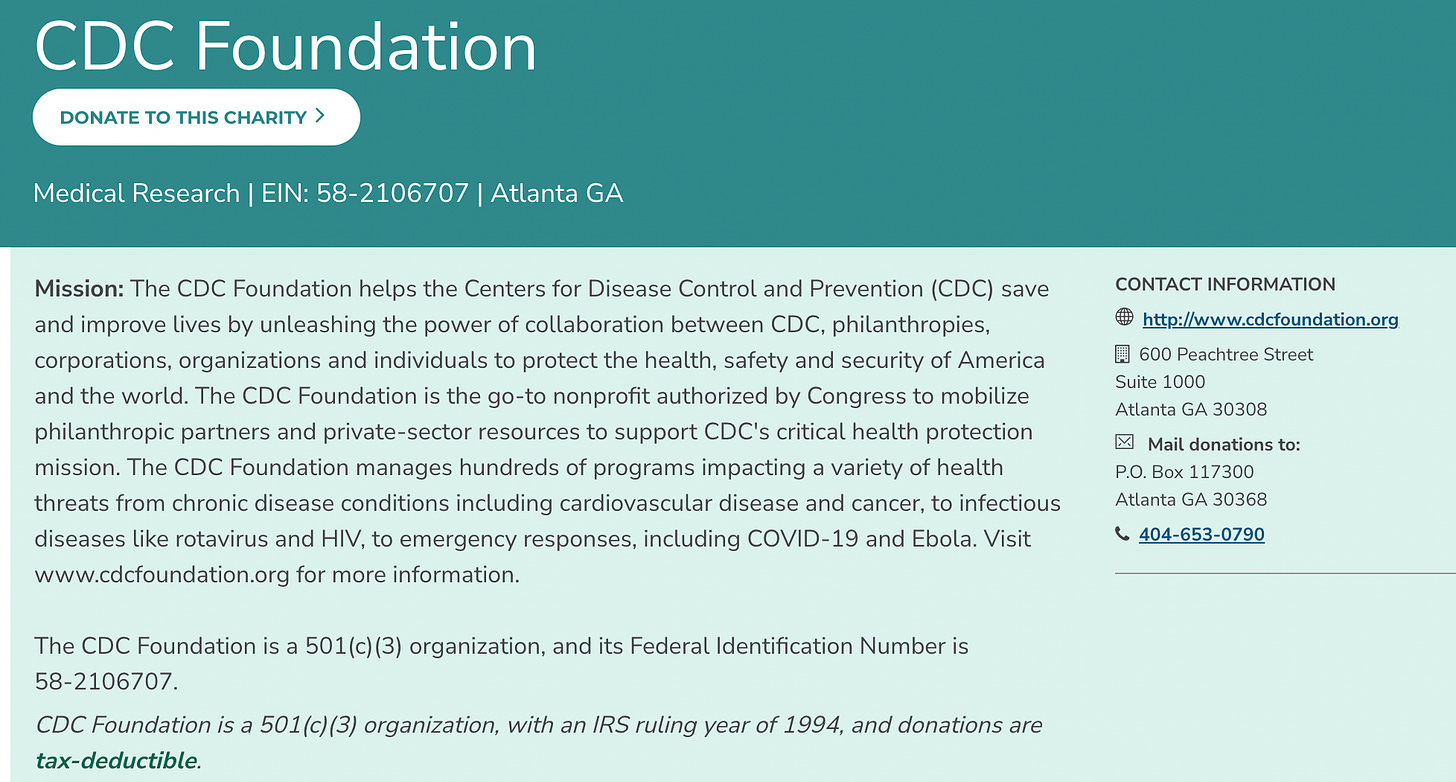
The CDC Foundation has been accused of egregious conduct since its inception and has received nearly 1 billion dollars from corporate “donors” (criticisms include a scathing editorial in one of the world’s top medical journals). Some of the best examples of this corruption are documented within this 2019 letter to the CDC from a group of non-profit watchdog groups (I would highly advise reading the entire letter). To quote a few of them:
In 2011, Type Investigations reported that Exponent Inc, a firm that performs research for the pesticide industry, gave $60,000 to the CDC Foundation for a study to prove the safety of two pesticides. “We have a professional money-laundering facility at the Centers for Disease Control Foundation….They accept projects from anyone on the outside,” said James O’Callaghan, a researcher at the National Institute for Occupational Safety and Health (NIOSH).
During the years 2010-15, Coca-Cola contributed more than $1 million to the CDC Foundation.19 It also received significant benefits from CDC, including collaborative meetings, and advice from a top CDC staffer on how to lobby the World Health Organization to curtail its efforts to reduce consumption of added sugars.
The BMJ also reported on contributions from Roche to the CDC Foundation in support of the CDC’s Take 3 flu campaign, which encourages people to “take antiviral medicine if a doctor prescribes it.” Roche manufactures Tamiflu, an antiviral medication for the flu [for reference, Roche was able to convince governments around the world to stockpile hundreds of millions of dollars of Tamiflu while refusing to release any of their clinical data—and it was eventually concluded the benefits of the drug are negligible, while significant harms result from the medication].
CDC’s dealings with corporate interests have also drawn scrutiny and concern from Congress:
In February 2019, Congresswomen Chellie Pingree and Rosa DeLauro wrote the Inspector General of the Department of Health and Human Services calling for an investigation of CDC’s interactions with Coca-Cola. They noted that the evidence shows “a troubling pattern of the company using access to high-level CDC officials to shape debates over public health policy directly involving the nutritional value of its products.” The congresswomen requested that the Inspector General “determine whether there is a broader pattern of inappropriate industry influence at the agency, and make recommendations to address this issue.”
I cannot help but notice how much this resembles of a scene from this remarkably prescient movie:
All of of this in turn should raise a very obvious question.
Who Funds The CDC Foundation?
Through the work of watchdogs like the authors of the letter above, it is possible to discern who many of the primary funders of the CDC foundation are. Fortunately, the CDC also openly discloses their sponsors. Upon reviewing the largest donors, we find many familiar faces:
Large Partisan Organizations:
ActBlue Charities [ActBlue is a key advocacy wing of the Democratic party]
The California Endowment
California Department of Public Health
Vaccine Profiteers:
Bill & Melinda Gates Foundation [which has collected over half a billion from vaccines investments made at the start of the pandemic]
GAVI Alliance [which was created by the Gates]
Imperial College London [this was the group responsible for the catastrophic and deeply flawed models used to justify the COVID-19 lockdowns]
Vaccine Manufacturers:
(note: other pharmaceutical companies are also listed as sponsors)
Johnson & Johnson Foundation
Merck Sharp & Dohme Corp (Merck manufactures the HPV vaccine which, prior to COVID-19, was the most dangerous and unnecessary vaccine on the market).
Pfizer Inc.
Note: I suspect Moderna was not listed because they were yet a major player at the time these donations occurred.
Big Tech
Facebook
Google
Microsoft Corporation
PayPal, Inc.
Unfortunately, the CDC also does its best to obfuscate its funding by only stating if they receive more or less than 50,000 from each sponsor (this is somewhat analogous to how processed food manufacturers do their best to hide information from nutrition labels). For example, the Bill and Melinda Gates Foundation is simply stated as a party that donated over 50,000 dollars.
Fortunately, unlike many of the sponsors, the Gates Foundation does disclose the grants they have given the CDC, which for reference totaled to:
- 9.73 million in 2022
- 10.84 million in 2021
- 6.70 million in 2020
- 15.60 million in 2019
- 18.13 million in 2018
Thus, the CDC’s disclosures were accurate since each of these figures was “50,000 and above,” although I would argue they were quite misleading, as these figures clearly demonstrate sufficient bribery to override any pre-existing scientific integrity at the agency.
It is also important to consider that Congress’s main watchdog, the GAO also investigated this issue and repeatedly found that in Federal agencies including the CDC and FDA potential political interference occurred that potentially resulted in the alteration or suppression of scientific findings. Rather than address this issue, no mechanisms were available for whistleblowers to report incidents of corruption and the leadership of each agency appeared to deny any problems were occurring.
Direct Vaccine Sales
Many of you are aware of the feud between Moderna and the NIH over who owns the patent to their vaccine. To quote Nature:
The stakes are high. Moderna, which is based in Cambridge, Massachusetts, has projected that it will make up to US$18 billion on its COVID-19 vaccine this year. Inventor status could enable the NIH to collect royalties — potentially recouping some of its investment of taxpayer money — and to license the patent as it sees fit, including to competing vaccine makers in low- and middle-income countries, where vaccines are still painfully scarce.
Likewise, many parts of the federal government are financially incentivized to sell vaccinations and other pharmaceuticals as they both own patents on the pharmaceutical products and are paid by their manufacturers for the process of approving them. However, while these conflicts of interest are widespread (an excellent summary of which can be found here), I am less sure exactly how much money is ultimately made, as many tricks are available to hide that money (such as paying off regulators in the private sector after they leave the government). Fact-checkers for example acknowledge these conflicts of interest exist, but like everyone else insist their effects are minimal:
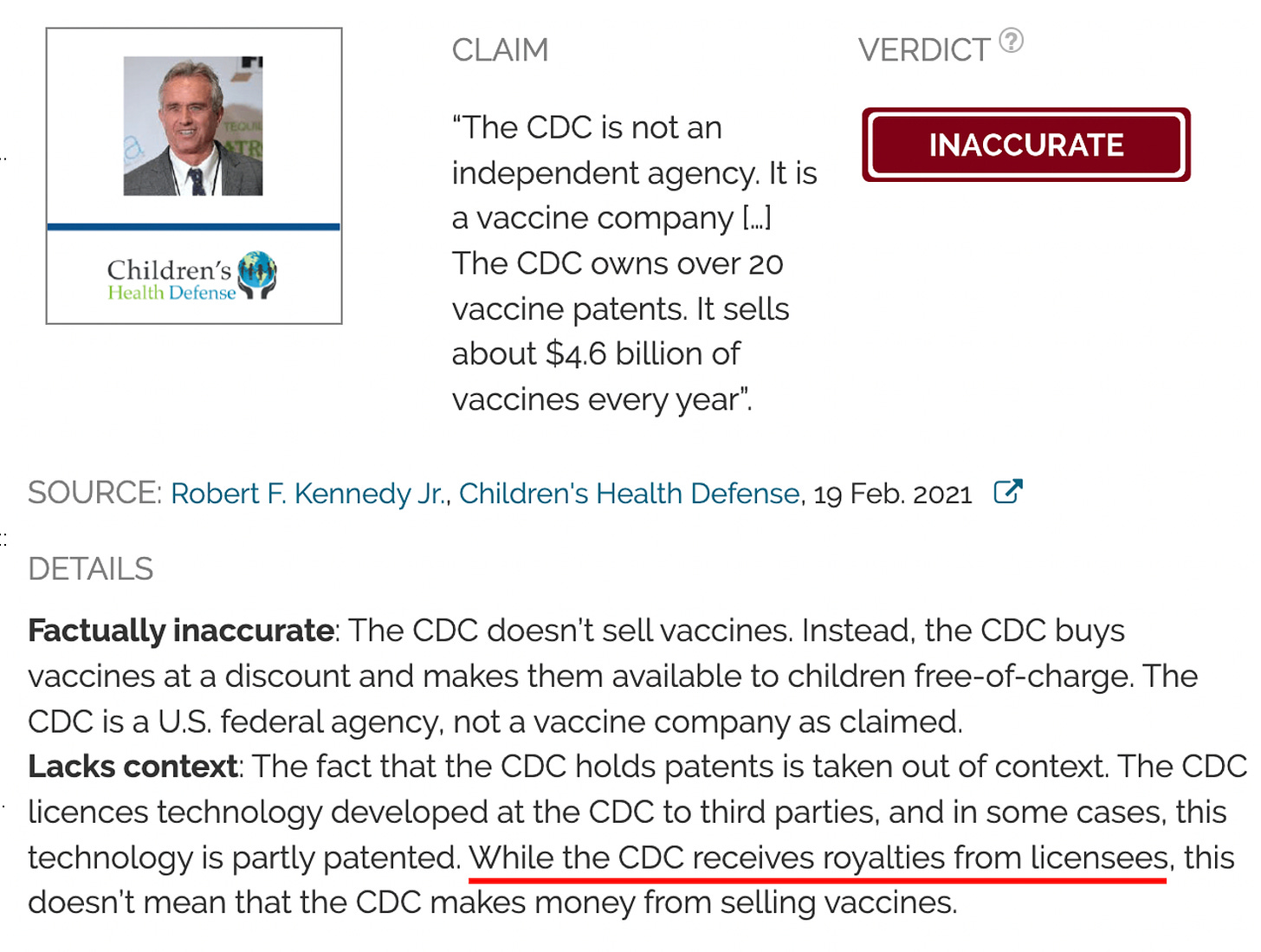
Many members of ACIP and the CDC have owned patents on the vaccines they voted to mandate upon the public. Despite this, they always claim these massive financial conflicts of interest they held have not clouded their judgment on which vaccines they approved (which is technically true since they almost always approve every vaccine that comes their way). Providing royalty payments to bureaucrats responsible for pharmaceutical approvals is a slippery slope that consistently incentives everyone within the federal bureaucracy to push through dangerous and ineffective products.
For example in the year 2000, following the Rotavirus vaccine debacle, a Congressional investigation found:
“Members, including the chair of the FDA and CDC advisory committees who make these [vaccine] decisions own stock in drug companies that make the vaccines.”
“Individuals on both advisory committees own patents for vaccines under consideration, or affected by the decisions of the committees.”
“Three out of the five of the members of the FDA’s advisory committee who voted for the rotavirus vaccine had conflicts of interest that were waived.”
“Dr. John Modlin served for 4 years on the CDC advisory committee and became the chair in February 1998. He participated in the FDA’s committee as well. He owns stock in Merck, one of the largest manufacturers of the vaccine, valued at $26,000. He also serves on Merck’s immunization advisory board.”
“Dr. Patricia Ferrieri, during her tenure as chair of the FDA’s advisory committee, owned stock in Merck valued at about $20,000 and was granted a full waiver.”
“Dr. Harry Greenberg, who serves as chair of the FDA committee, owns $120,000 of stock in Aviron, a vaccine manufacturer. He also is a paid member of the board of advisors of Chiron, another vaccine manufacturer, and owns $40,000 of stock.”
Conclusion
Oddly enough, although I expect the members of the CDC’s panels who voted for this mandate will each experience significant repercussions for their actions in the future, I do not blame the panelists for this decision, as their approval appears to be a mere formality. In the one case I know of where ACIP voted against approving a vaccine (specifically COVID-19 boosters for the workplace), CDC director Rochelle Walensky (who is directly accountable to the CDC’s sponsors), in a “highly unusual move” overrode ACIP and nonetheless approved it.
Many outside observers suspect this approval was done to shield the vaccine manufacturers from the inevitable liability they were facing from the explosion of severe injuries from the vaccines and mounting evidence the vaccines were fraudulently marketed (e.g. they are not effective at preventing COVID-19 or transmission of the disease). By being added to the schedule, this affords the COVID-19 manufacturers the absurd protection that was enshrined by the 1986 National Childhood Vaccine Injury Act a law (brokered by Fauci) that removed the ability of those harmed by vaccines to sue vaccine manufacturers for their injuries (and for parents of vaccine injured children to receive any support or compensation for many vaccine complications).
By removing all liability for vaccine manufacturers, any incentive for the pharmaceutical industry to produce safe vaccines was eliminated, and a lucrative vaccine market was created. Following the passage of this act, a glut of unnecessary vaccines were developed, rubber-stamped by ACIP and the CDC, forced onto our children, and shortly after, an explosion of chronic disease and disability occurred. Not surprisingly, the agencies of the government responsible for discovering the cause of this modern-day epidemic (the CDC and Fauci’s NIAID) after decades of research, are still no closer to determining what caused it.
Although many (especially those who have already experienced what happened in California) are horrified by this turn of events, I believe this decision has presented a remarkable opportunity. The extreme consequences of this decision, the blatant absurdity of it, and the public attention it will inevitably bring as it injures our children may finally bring widespread attention to the corruption within the CDC and the highly questionable approvals of many previous vaccines they have pushed onto the market. In short, I am hopeful we may, at last, be close to rectifying the disastrous consequences of the 1986 Vaccine Act.
Although I was unable to obtain records for the current ACIP members (who in a recent JAMA editorial denied any conflicts of interest), like the CDC, the ACIP has been plagued with significant financial conflicts of interests in its members since its inception. Likewise, in the most recent investigation I know of, I found that even in 2019, conflicts of interest were still present throughout its membership:
One member is Kevin Ault. He has received “research funding” from large vaccine makers like Merck. In fact, Dr. Ault served as a clinical trials investigator for Merck’s Gardasil vaccine during his tenure at University of Iowa School of Medicine. He called cervical cancer “a vaccine preventable disease.” Christina Tarsell died from the vaccine.
Another member of the CDC’s Vaccine Advisory Committee is Peter Szilagyi. He has received over $10 million from CDC to research vaccines.
Another member is Dr. David S. Stephens. He has served on review panels for the NIH, FDA and CDC. He also holds vaccine related patents. Yet he is sitting on committees that will decide what vaccines are mandatory for every child in the country.
I mention all this because one of the my favorite quotes is “Don’t sell your soul to the eye on the back of the dollar bill,” and it is my sincere hope those in positions of power will stop choosing to make money over doing the right thing. Unfortunately, throughout human history, human beings have been well known to do the opposite.
One famous historical figure, Rudolph Steiner, provided many insights on the nature of reality that attracted a large following which still persists more than 150 years since his passing. At one point, Steiner was asked what was needed for the human species to evolve, and he stipulated three critical conditions must be met. The first of these three was that man must stop working for the sake for money.


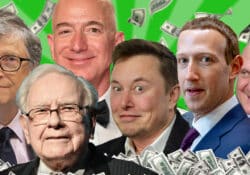


0 Comments